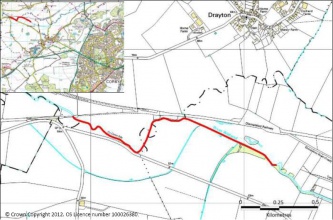Case study:Drayton
Project overview
| Status | Complete |
|---|---|
| Project web site | |
| Themes | Habitat and biodiversity |
| Country | England |
| Main contact forename | Environment Agency Customer Contact |
| Main contact surname | Anglian Northern Area |
| Main contact user ID | |
| Contact organisation | Environment Agency |
| Contact organisation web site | http://www.environment-agency.gov.uk |
| Partner organisations | Welland Rivers Trust, Wild Trout Trust |
| Parent multi-site project | |
| This is a parent project encompassing the following projects |
No |
Project summary
The scheme was implemented by the Environment Agency with the co-operation and agreement of the adjacent landowners (Matthew and Melanie Robinson and Alister Brooke-Clarke) and in-kind support from the Welland Rivers Trust and the Wild Trout Trust.
Summary of Techniques: Faggot, woody debris and coir roll flow deflectors; channel pinching using faggots, woody debris and coir rolls; introduction of gravels to augment and create riffles; bank toe protection using rock and coir; new cattle drinkers; riverside fencing; selected tree works including crown-lifting and pollarding; new tree and shrub planting; artificial otter holt construction.
Background During the 1970s the River Welland was significantly modified. The natural river morphology was altered to improve land drainage and flood water discharge. The river was deepened; many meanders, pools, riffles and glides were removed; and the river was constricted within high, straight banks. High winter flood flows and poor land management practices now cause significant bank erosion and sedimentation. Prior to modification a high proportion of these nutrient-rich sediments would have been deposited on the floodplain, providing rich grazing pasture, but, as a result of the flood defence works, a large proportion of these sediments now remain in the channel, degrading habitats including fish spawning gravels.
Monitoring surveys and results
Lessons learnt
Image gallery
|
Catchment and subcatchmentSelect a catchment/subcatchment
Site
Project background
Cost for project phases
Reasons for river restoration
Measures
MonitoringHydromorphological quality elements
Biological quality elements
Physico-chemical quality elements
Any other monitoring, e.g. social, economic
Monitoring documents
Additional documents and videos
Additional links and references
Supplementary InformationEdit Supplementary Information
| |||||||||||||||||||||||||||||||||||||||||||||||||||||||||||||||||||||||||||||||||||||||||||||||||||||||||||||||||||||||||||||||||||||||||||||||||||||||||||||||||||||||||||||||||||||||||||||||||||||||||||

